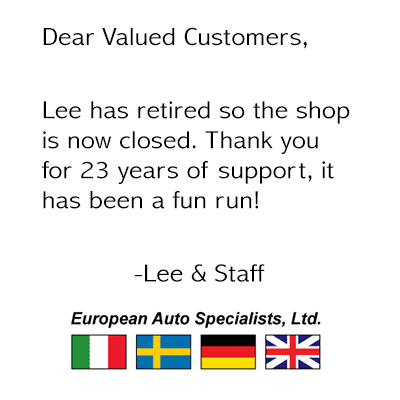Signs Your European Brakes Need To Be Replaced Soon
Brakes are your vehicle’s lifeline—literally! They are your car’s most important safety feature; seatbelts absolutely save lives, but if a cliff is looming ahead, brakes are your best friend. This is especially true if you drive a high performing vehicle like a Porsche or BMW—a high quality import brake job may be all that stands between you and death.
An Early Import Brake Job Saves You Cash In The End
It’s a good idea to keep in mind that the cost of an import brake job is highly relative to how long you put it off. If you are proactive with your European brake repairs, you’ll minimize the expense. When you continue driving too long on a worn out brake pad, for example, the depleted brake pads will eat right through the rotor, which will then need to be replaced. And for European cars, the cost to replace a rotor can be higher than for domestic cars. If you treat your brake repair as part of your regularly scheduled import car maintenance, you will ultimately cut your costs and save money in the long run.
Fortunately, if you are wondering whether it is time for an import brake job, checking the thickness left in your brake pads is fairly simple to do. You could check it yourself or take it to a professional auto repair shop you trust. In some vehicles, you don’t even need to take the wheel off (though you may need to remove the hubcap). Look through the spokes of your wheel to the shiny rotor underneath. Between the metal caliper and the rotor, you can find the brake pad. If you can’t see it, you can jack up the car and pull a tire to check on your European brakes. Check to see if the front brake pads that you can see are at least 1/8 of an inch thick—this thickness doesn’t include the metal backing on the brake pads. If anything less, it’s time to talk to your local auto repair shop have your brakes replaced.
Other Signs That You You Need to Replace Your Brakes
While you are checking out your brake pads, you should also check the rotor itself for wear. Rotors should always be pretty smooth. Any nicks or deep pits mean you may need to get the rotor replaced when you get your import brake job.
Some other things to keep an ear out for are unusual sounds when you hit the brake pedal. European brakes shouldn’t be making strange noises, and if you hear them, you might be ready for an import brake job. A high pitched squeal is an indicator in your braking system that lets you know it’s time. As brake pads start to get thin, there is a clip that automatically drags across your rotors when you hit the brakes. The squeal this clip makes is your early warning system that you will soon need new European brakes. If you hear a grinding sound after ignoring the squealing, this means that you may have already eaten through the brake pads and have ground down your rotors. If you hear grinding, or the car vibrates when you hit the brakes, that likely means you’ll also need a new set of rotors.
Don’t Forget The Importance of a Brake Flush Service
In addition to regular brake inspections and import brake job services, it is also critical to have your brake fluid inspected. Theoretically, since the brake fluid operates in a closed system, it can be used indefinitely. It doesn’t remain a a closed system, however, if leaks in the hoses and other parts of the braking system expose the fluid to water, dirt or other debris. As a general rule of thumb, you should have your brake fluid checked out by a professional in European car repair at least one a year.
If the fluid is a dark brown color, you will need to have it replaced by having a brake flush service. This service will replace the fluid in your braking system, flush out the system, and prevent moisture and corrosion from damaging your brake lines and other components. It is the best way to ensure optimal braking and safety. Moisture in the brake lines reduces the effectiveness of the brakes, wears down the components of the braking system, and can even lead to brake failure.
Looking for a Superior Import Automobile Repair Shop?
We love doing import car maintenance and import brake jobs on the finest of European vehicles, including:
- Porsche brakes
- BMW brakes
- Jaguar brakes
- Volvo brakes
- Volkswagen brakes
- Audi brakes
- And more
We can inspect the fluid during any import brake job, import car maintenance or inspection. All you have to do is ask. Give us a call at our Cincinnati, OH auto repair shop, or fill out our online contact form right from your computer to schedule an appointment. When you make your appointment we will be happy to go over all the details with you, whether it is how long your repair will take or how much it will cost in the end. Give us a call, we will be happy to chat.

